I know approximately two things about Sound! Euphonium (2015). First, it is one of Kyoto Animation’s prettiest and perhaps most iconic works, proudly demonstrating the studio’s dedication to beautiful visuals and attention to detail as well as many of the now-famous hallmarks of its co-director Yamada Naoko. Fans of capital A Animation love it—everything I know about flower language, I know from Emily Rand waxing poetic, often about Yamada’s works; and a cut from the Sound! Euphonium spinoff movie Liz and the Blue Bird emblazons the header of the Sakuga Blog.
The second thing I know about Sound! Euphonium is that it’s really gay but also it isn’t. Just as many animation nerds love the series, many yuri fans hold it close to their heart with a fiery love/hate relationship. Even without having seen the show, this is something I’ve witnessed like a storm on the horizon and come to understand through pop culture osmosis. The repeat mantra is that Sound! Euphonium is a great series and it’s so weird that it never got a second season! (Reader, it has a second season—and in fact a third season which is airing right now.)
But, okay. What is this series actually like? Continuing my KyoAni education, nearly a decade since it originally hit airwaves, here I am to experience Sound! Euphonium for the first time in all its glory—with a friend and pre-existing fan on hand, to guide me through and cackle at me as I go through five stages of yuri grief all at once, then again, and in no particular order. With the overture out of the way, let’s begin…
The first point definitely holds true. This is a gorgeous show, crammed full of beautiful humanistic details that make the characters feel individual and alive, and the world feel lived-in. It balances harsh realism (god, being in concert band seems tough) with a romantic view of youth to great effect. While this sprawls outwards into an ensemble piece at times (fittingly enough—they’re an orchestra, get it?) ultimately this is the very satisfying coming-of-age story of one Oumae Kumiko, a girl who starts out quite directionless, awkward, and petty, and evolves into someone with a sense of true passion and drive.
And at the heart of that character arc is a girl named Reina, introduced in the show’s very first scene. Kumiko makes an offhand comment about them losing a concert band competition that makes Reina cry, and the interaction haunts Kumiko as she heads into high school… where, to her horror, Reina is also enrolled. Kumiko, flaky little shit that she is (and I mean that affectionately; I kind of love how unlikeable and relatably adolescent she is at times), spends the first arc avoiding Reina while simultaneously being fascinated by her. The ambitious, prickly Reina holds a magnetic pull that Kumiko can’t seem to shake off, and she keeps ending up in her orbit. The two progress from apologies to moonlit music sessions to promises to stay by each other’s side. And yeah, I have to say, the whole thing’s pretty gay.
There is so much about their dynamic that signals love interest, from the lush, ethereal visuals that scream “romance!” in cinematic language whenever we see Reina from Kumiko’s perspective, to the way that her connection to Reina ultimately sends Kumiko down the path to her own character development. The parallels between the two girls underscore the themes of the whole show, and the intimacy between them forms the emotional crux of the narrative (not to mention the centre of some truly powerful individual scenes). The two of them saying the words “this is a confession of love” to each other is also, well, it’s difficult to look past, you know? The visual language, verbal and physical interactions, and story framing paints them as two characters falling in love.
The bloody ending credits animation also shows them joined by a red string of fate, with Reina holding up her hand and pointing to it just to really make sure you notice. Genuine question: what on earth is that meant to mean if they’re not love interests?
Yet there’s a snag. Occasionally these romantic overtones are interrupted by the insistence that Reina and Kumiko are actually interested in other, male characters. Kumiko has an awkward will-they-or-won’t-they with her old friend Shuichi wherein he clearly has a crush on her and she ranges from being confused about her feelings to outright grossed out by the idea of being his girlfriend. Reina, meanwhile, takes time out of a climactic late-game episode to matter-of-factly declare that she’s in love with their conductor, Taki, to which Kumiko replies “Huh?” Me too, Kumiko, me too.
Kumiko and Shuichi’s plotline is at least a consistent background bubble of emotional drama, but Reina announcing her love for Taki like it’s the train schedule feels sudden, out-of-nowhere, and frankly out of character. So what’s going on there? Are these girls heterosexual after all and the whole mountaintop confession of love was just… what? A farce? A lapse in writing direction? A trick to send yuri-hungry audiences into a merch-buying fugue state, with no intention of following through? Many seem to think that last one is the case.
“Queerbaiting” is one of those fandom/media analysis terms that has been overused and misused to the point of its meaning becoming diluted, so I’m honestly reticent to bandy it about here. In its original and proper incarnation, “queerbait” implies a degree of calculating market savvy and bad faith on the creators’ part that I just… don’t quite feel from Sound! Euphonium. The romantic tension between Kumiko and Reina feels like one of the most sincere and sweet elements of the story—it’s what ties everything together. Their relationship is the immovable core of the narrative, and if anything it’s their apparent crushes on men that feels cynically and awkwardly shoehorned in.
Apparently, the relationship between Kumiko and Reina is not nearly as pronounced in the books on which this anime is based. While I haven’t read the novels and cannot personally verify this, it’s interesting to even just read the synopsis and note that Reina is nowhere to be seen—a far cry from how pivotal she is to inciting and driving the plot in the anime. What this may mean is that this KyoAni team was tasked with creating an adaptation of a novel and instead made a lovingly-animated 13-episode femslash fanfic of it, shoving the canon love interest (Shuichi, allegedly) off the page and plonking beloved blorbo Reina in the spotlight in his place. The fact that they did this is brilliant but also quite baffling. If Dominic Noble ever decides to cover the intricate rituals of yuri-adjacent anime, this would be a fascinating Lost in Adaptation episode.
Anyway, learning that the anime differs significantly from its source material shed some light, for me, on why Sound! Euphonium sometimes felt like it was being tugged in two different directions. Reina and Kumiko share a spellbinding moonlit heart-to-heart where they say things like “I want to peel the good girl skin off you”, and an episode or so later the audience is hit over the head with Reina’s flat-toned and matter-of-fact insistence that she’s in love with Taki-sensei. It contradicts her poetic “confession of love” to Kumiko on the mountaintop, and it’s a tonal shift that doesn’t match the energy of previous parts of the story.
It’s alright, though: a couple episodes later we get another deeply romantically-charged scene between the two girls, where Kumiko repeats Reina’s confession of love line right back to her and they stand holding each other, faces nearly touching. At times watching this show feels like watching one of those Daffy Duck vs Bugs Bunny bits where they’re arguing “duck season! / rabbit season!” except it’s the script arguing with itself.
In the end, Reina being in love with Taki is a detail that can be removed wholesale from the story (of Season 1, anyway—I’ve heard Some Things about Season 2) without any of the events being affected. The plotline about his possible nepotism and conflict of interest can still function perfectly since the most important aspect is that she and the teacher know each other, regardless of Reina’s feelings for him. The only time Reina’s crush comes back up is a one-off joke where Kumiko offhandedly says she’d just been chatting to Taki, and Reina gets flushed and annoyed when Kumiko gets distracted by musical mascot toys instead of giving her all the deets (Kumiko cares about instruments more than men, it seems).
Likewise, Kumiko’s complicated feelings for Shuichi sort of taper off and vanish from the narrative. The plotline about him asking her to the festival and her awkwardly rejecting him (to instead go with Reina, enabling the above-mentioned love confession scene) serves a purpose and is emotionally interesting, so I wouldn’t be as quick to say “edit it out”. But the finale of the show dedicates very little time to him and Kumiko getting closure: they get a cute, awkward fist-bump to wrap things up, and then the emotional high of the series—and the scene that brings us right back to the beginning of the story to show how far the characters have come—is once again dedicated to Kumiko’s relationship with Reina. (We talk a lot about queer erasure, but was this… straight erasure?! I digress.)
It’s honestly a very sweet and satisfying conclusion, neatly bookended, and is part of why I’m not sure I’m keen to continue the series into Season 2. It feels self-contained, delightful, and again, all hinges on the intimacy and understanding that’s grown between these two girls. Reina is crying again, but this time it’s for joy, and Kumiko is sharing and understanding that joy in a way she didn’t before—and couldn’t have, without all this. I say again: it’s pretty romantic. Except it’s not. Or is it?
The state of queer representation in the media—across the world—is evolving constantly, and was in a very different spot back in 2015 when Kumiko dreamily followed Reina up those mountain steps, only for Reina to (apparently) give her heart to a male side character. With the benefit of hindsight, it may be tempting to call this a weaksauce and non-committal bit of sapphic writing. These days, after all, we have anime like The Magical Revolution of the Reincarnated Princess and the Genius Young Lady where girls unambiguously say “I love you” and kiss on the mouth. However, we shouldn’t be too quick to scoff at older media, nor should we get too complacent and assume it’s All Better Now: we still have cases like Mobile Suit Gundam: The Witch From Mercury where the creative team’s earnest attempts at queer storytelling were overshadowed by nervous corporate attempts at censorship.
Sound! Euphonium sits at a media history crossroads in a way that’s fascinating to me. You have to wonder, if it was made now, would they have gone all in and not bothered with the plotlines that limply insist that these girls have male love interests? From everything I hear, Liz and the Blue Bird, which was made a few years later and with more creative freedom, is Yamada finally getting to play out a tender story of love between young women. It’s tempting and bittersweet to imagine the alternate reality where she got to do that with Kumiko and Reina, speaking even more directly to the queer fans who found that the characters resonated, and unfettered by “up for interpretation”-style studio meddling.
Then again… Sound! Euphonium is, by its nature, tugged in all directions by various behind-the-scenes tensions. Chiefly, by the tension between faith to the source material and the desire to warp the story so Kumiko’s most important dynamic was with a female side character. The end result of all this tug-of-war is a story that’s lovely but sometimes very emotionally confused, and confusing to watch. With the power of retrospect and a catalogue of other queer media to enjoy, it’s a little bit darkly funny, but I can imagine the heartache it must have caused for the viewers who got invested in a sapphic love story that was repeatedly dangled in front of them and then abruptly tugged away (with no solace to be found in the source material, which, again, is apparently significantly more straight).
Sound! Euphonium is an enjoyable watch: it’s an intense little character drama with a fully realised cast, and a protagonist who’s delightfully flawed and prickly. It’s also a time capsule and a unique mess of creative direction and adaptational choices. There’s nothing quite so compelling as a story that contains great potential but stumbles, and I can 100% see why the fandom for this show and this ship has endured for nearly a decade—and, I imagine, will keep enduring, even if none of those people watch a single minute of the third season (to quote the friend who sucked me into this, “call me if Reina and Kumiko kiss, otherwise I’m not really interested”).
Who knows? It could happen. As I said, the industry landscape for queer characters in anime has changed somewhat since 2015 and new boundaries are being pushed all the time. But for now, Sound! Euphonium Season 1 remains a lovely but discordant song. In the hearts of many—and now mine, too—Kumiko and Reina are forever up on that mountain playing their duet.
Like this blog? Consider buying me a coffee or supporting me on Patreon!

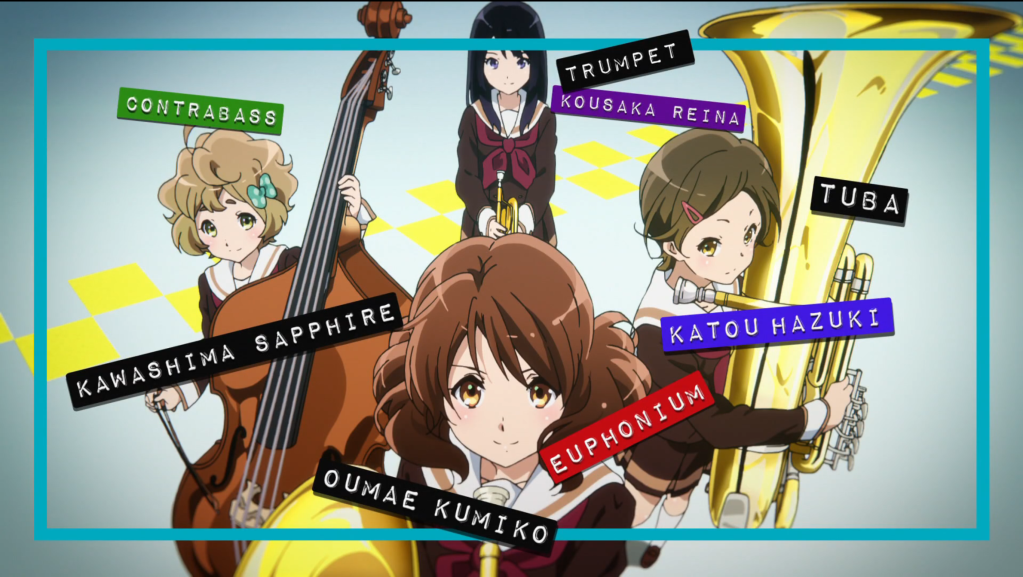

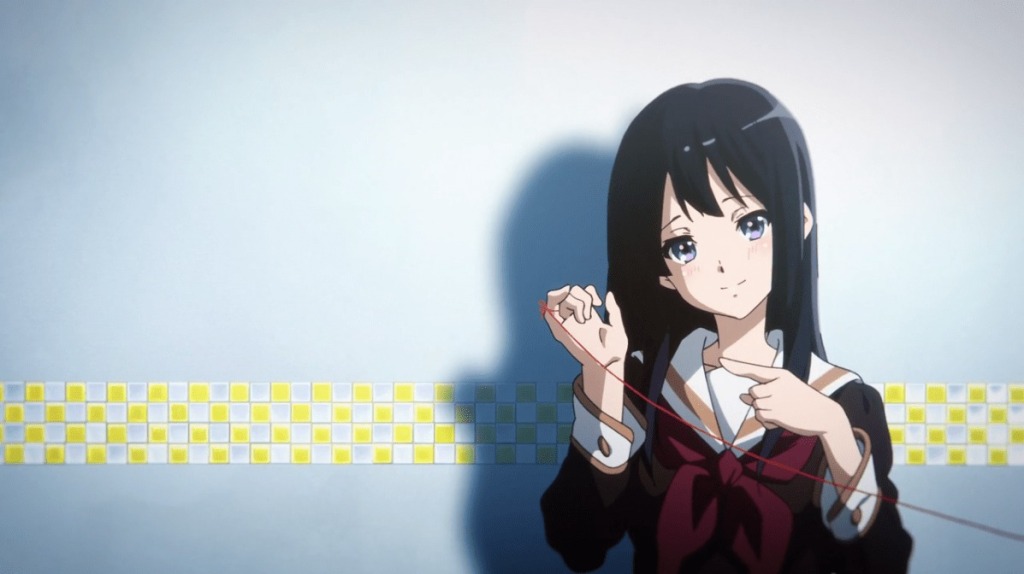
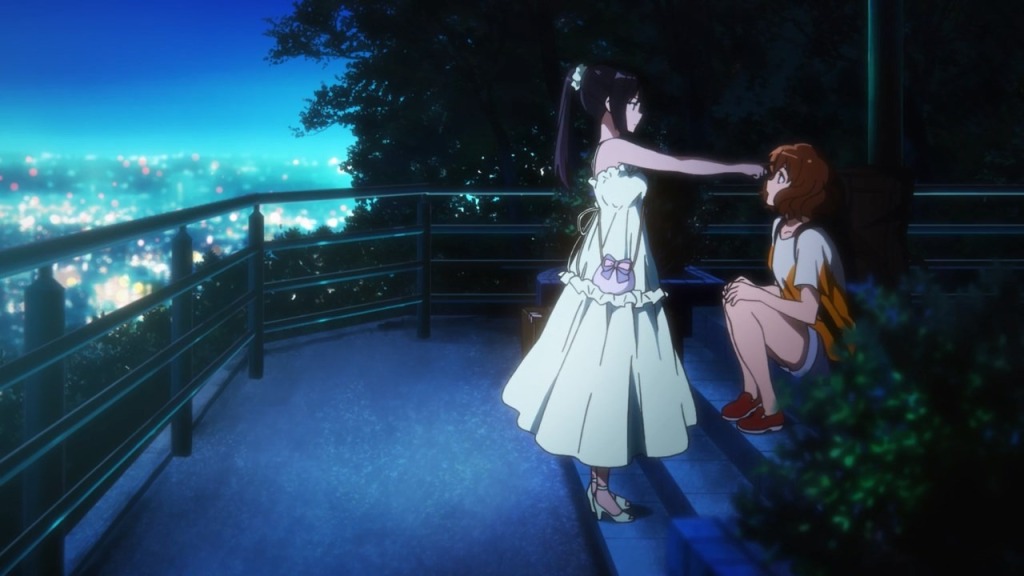
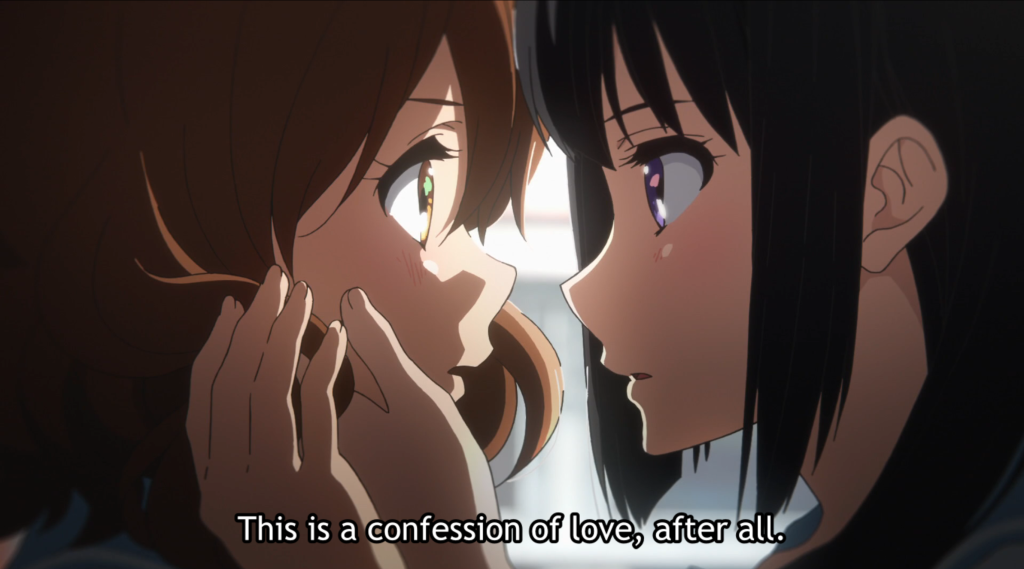
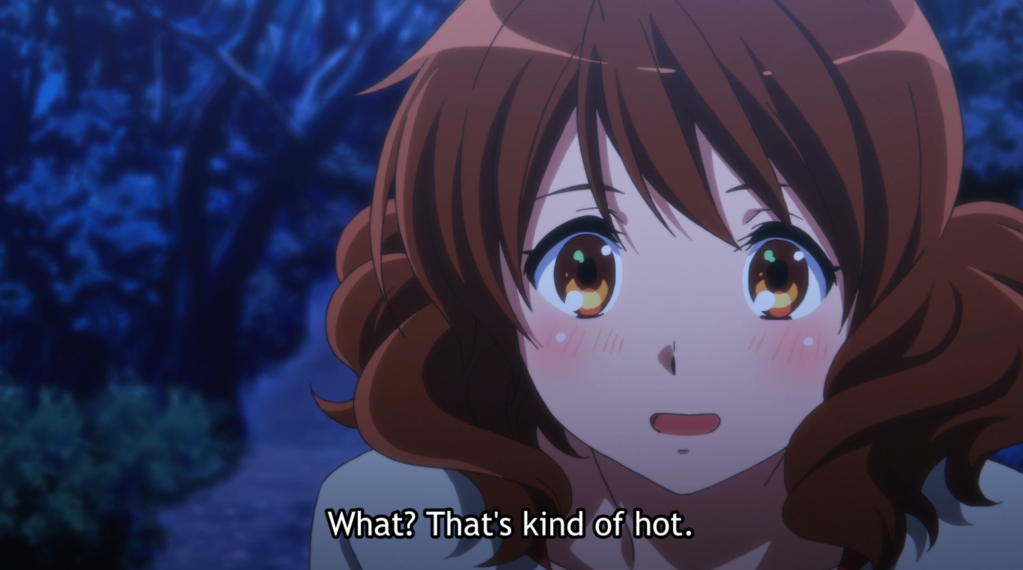
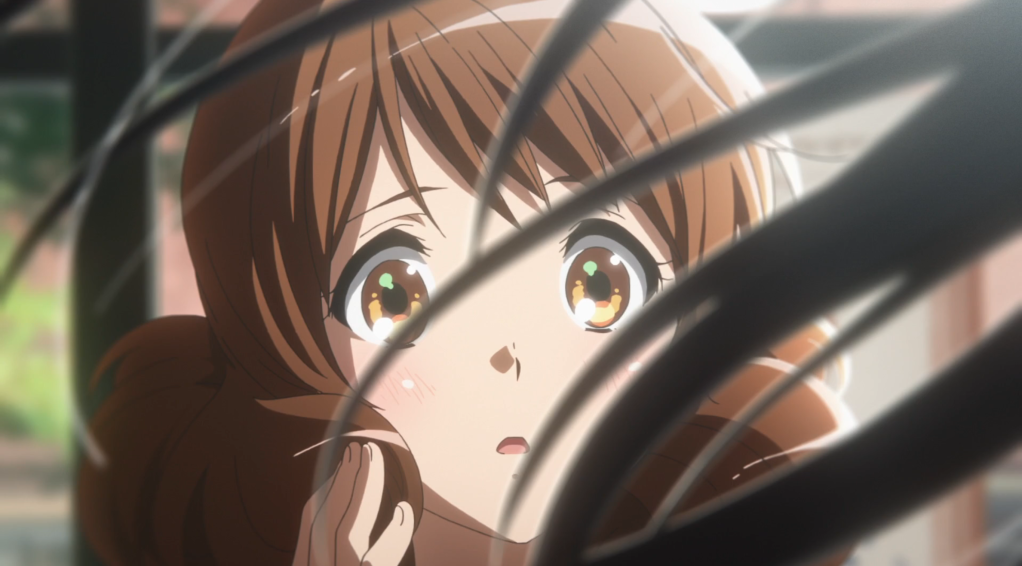
“In the hearts of many—and now mine, too—Kumiko and Reina are forever up on that mountain playing their duet.” What a beautiful line to end on. Still no kiss, but I do imagine you would have plenty to write (good and bad) about season 2, the movie, OVA, and now season 3.
“In the hearts of many—and now mine, too—Kumiko and Reina are forever up on that mountain playing their duet.” What a beautiful line to end on. Still no kiss, but I do imagine you would have plenty to write (good and bad) about season 2, the movie, OVA, and now season 3.
“In the hearts of many—and now mine, too—Kumiko and Reina are forever up on that mountain playing their duet.” What a beautiful line to end on. Still no kiss, but I do imagine you would have plenty to write (good and bad) about season 2, the movie, OVA, and now season 3.
“In the hearts of many—and now mine, too—Kumiko and Reina are forever up on that mountain playing their duet.” What a beautiful line to end on. Still no kiss, but I do imagine you would have plenty to write (good and bad) about season 2, the movie, OVA, and now season 3.
“In the hearts of many—and now mine, too—Kumiko and Reina are forever up on that mountain playing their duet.” What a beautiful line to end on. Still no kiss, but I do imagine you would have plenty to write (good and bad) about season 2, the movie, OVA, and now season 3.
Pingback: Weekly Round-Up, 22-28 May 2024: Indie Otome Spotlight, Ashihara Hinako Memorium, and Discrimination Bills - Anime Feminist
Pingback: The End of the World As We Know It: May ’24 Roundup | The Afictionado